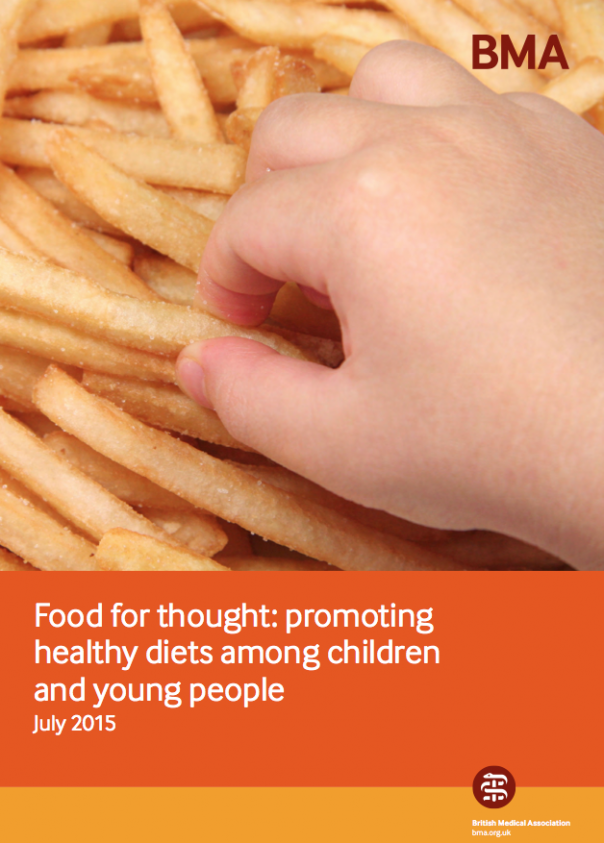Doctors call for 20% tax on sugary drinks in new report

Sugary drinks should be faced with a 20% tax to tackle the obesity crisis, the British Medical Association has advised in a report published today.
The BMA said poor diets accounting for around 70,000 premature deaths each year, accounting for around 12% of the total number of deaths, but imposing the tax could reduce the crisis in the UK by around 180,000 people.
In its Food for Thought report published today, the BMA suggests the money raised from the tax could be used to subsidise cheaper fruit and vegetables for poor families.
The organisation warns that a 330ml can of pop is likely to contain up to nine teaspoons of sugar that are simply ‘empty calories’. Doctors claim a tax of at least 20% would be needed to deter customers, meaning a 65p can of fizzy drink would cost at least 78p and a two-litre bottle would rise from £1.85 to £2.22.
Professor Sheila Hollins, BMA board of science chair, said: “Doctors are increasingly concerned about the impact of poor diet, which is responsible for up to 70,000 deaths a year, and has the greatest impact on the NHS budget, costing £6bn annually.
“While sugar-sweetened drinks are very high in calories3 they are of limited nutritional value and when people in the UK are already consuming far too much sugar, we are increasingly concerned about how they contribute towards conditions like diabetes.
“We know from experiences in other countries that taxation on unhealthy food and drinks can improve health outcomes, and the strongest evidence of effectiveness is for a tax on sugar-sweetened beverages. If a tax of at least 20 per cent is introduced, it could reduce the prevalence of obesity in the UK by around 180,000 people.
The report also calls for a change in the overall approach to diet-related ill health, with calls for a strong regulatory framework being central to the approach of reducing the burden of diet-related ill health in the UK.
The BMA advises regulatory-level changes to the mass media advertising of unhealthy food and drink products to children and young people. The recommendations include revising the UK Code of Broadcast Advertising to prohibit advertisements in or around any programmes that appeal in any way to children and young people.
A revision to the UK Code of Non-broadcast Advertising, Sales Promotion and Director broadcast media should also be made to include specific provisions preventing the marketing via non-broadcast media (including the promotional offers, licensed characters and celebrity endorsements) that appeal in any way to children and young people.
The BMA also calls for mandatory food standards surrounding school lunches and foods available during the day. Currently all state schools in Northern Ireland, Scotland and Wales have mandatory food standards in place, however over 3,500 academies and 200 free schools have to rely on their governing body to voluntarily agree to meet the standards. The BMA is calling for all academy and free schools in England to be legislated to meet the standards.
The provision of free fruit and vegetables should be made available to all primary school children throughout the UK five days a week. Currently only all grant-maintained schools in England receive the provision, however primary schools with academy or free school status do not. In Scotland, it is up to each local authority and there are no comparable schemes in Northern Ireland and Wales.
The BMA also advises that consideration should be given to extending the provision of free school meals in Northern Ireland and Wales to be universal rather than based on entitlement.
Hollins added: “Children’s diets are easily influenced, so regulating the food provided in schools, and providing free fruit and vegetables in primary schools, is an important way to support healthier diets among children and young people. All academies and free schools must be subject to the same mandatory standards as state schools, as without them they are more likely to provide cheaper, poorer quality food.”
The report also tackles issues in food standards in hospitals, care homes, processed foods and the retail environment.
The organisation calls for the UK health departments to work together to develop and implement consistent and comprehensive hospital food standards, which should be introduced as a statutory requirement.
The sale of all unhealthy food and drink products should also be phased out in all NHS hospitals, supported by the development and implementation of UK-wide mandatory regulations.
In social care settings, such as nursing and residential homes, specific standards relating to nutritional content of food and drink provided should be introduced on a statutory level. Currently only overarching requirements have been developed requiring food to be nutritionally balanced and varied but no regulation on the nutritional content of the food has been passed.
The organisation also targets caterers to reduce salt, fat, saturated fat and added sugar levels.
The BMA believe a one-year target should be set for manufacturers, retailers and caterers to not produce or sell any food and drink products containing artificial trans fats in the UK and that regulatory measures should be implements if this target is not met.
All manufacturers, caterers and retailers should also prioritise action to systematically reduce salt levels in all food and drink products sold and produced in the UK in line with the revised UK-wide 2017 targets, with a view to meeting the 6g per day population intake goal for aducts.
Finally, UK-wide targets, to be achieved by 2020, should be set for manufacturers, retailers and caterers to reduce calorie, fat, saturated fat and added sugar levels for the following product categoriesa: soft drinks with added sugar; chocolate and chocolate confectionary; biscuits; cakes; pies and pastries; dairy products; sausages; savoury snacks; chips and friend and roast potatoes.
